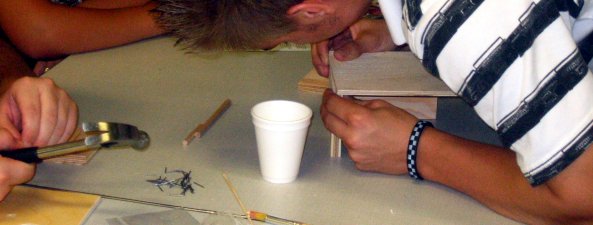
Hugh asked yesterday, “So, how’d it go? ![]() ”
”
It rocked. For real.
So here’s the skinny – > I have found the pot of gold.
Directions Teaching Team
I work with an amazingly committed, dedicated, and caring group of teachers. Add that to the fact that they have a talent for teaching that includes an understanding of curriculum that is rock solid and flexible at the same time.
Walter – Grade 10 core teacher (brand new curriculum this year!) and Grade 11 remedial math teacher. His second year in the program. One of my students wrote that she never in her life thought she would meet someone who would support her the way he did last year. He teaches a straightforward curriculum with humour and caring. Every time I run into him in the hallway he says, “I love my class.”
Collin – Grade 11 core teacher, Grade 10 remedial Science teacher, and head teacher. He’s been with Directions for 7 years (I think). Always full of energy, no matter how tired. He’s been at the school until 9 or so each night, planning and meeting with kids and parents who may still want to join the program. I can tell he’s got a spark burning on the inside at all times for what he does. He’s a strong believer in tough love and performs it well. Every day so far this week at least one graduate of the program has wandered in asking, “Is Collin around?” and he gives each of them a big hug no matter how busy he is.
Marie – Our special ed technician and CEO :) She’s been working with Directions for 12 years (I think). Throughout the day you hear the phrase, “Where’s Marie?” asked constantly because she holds the key to everyone’s answers. She will be working with our students who need extra assistance. More importantly she’ll be working with us in our classrooms. How freaking lucky are we?!
Tracy – That’s me! Grade 11 core teacher, Grade 10 math teacher, and Grade 10 Remedial history teacher. 1st year at Directions. Exhausted after this first whirlwind week of meeting new students, working with a new team, and starting my own new semester at Concordia University (Here’s the course website for one of the courses – it is going to be a hot year of work and learning). I teach with a smile, yet I hold firm to my expectations. Trying to teach outside of the box for these kids who need it – though sometimes unsure as to what exactly the box is to begin with (in particular for math)!
Genevieve – Grade 10 and 11 French teacher. She is a godsend because apparently last year the Directions teachers had to teach French as well as everything else (read – had no breaks during the day). She seems to be already making even the students who can not (and don’t want to) speak French comfortable. She is also very open to the flexible scheduling we need in the program, agreeing to meet with us each Friday after school to set the French schedule for the following week. She admitted that she was wary of the Directions groups at first (other teachers told her they were the ‘bad’ kids) but she is bubbling over with enthusiasm after having met each of the groups once so far. (Especially compared to her 38 student regular Grade 11 class! THIRTY EIGHT students who need to pass a Provincial French exam at the end of the year IN ORDER TO GRADUATE FROM HIGH SCHOOL! That’s a whole other post…)
Kara and Max – the Physical Education teachers. 2 more godsends as Phys Ed was also part of the course load for Directions teachers last year! The kids haven’t yet had a Phys Ed class, but so far they both seem eager to work with us as part of the Directions team and we’re working together on ways to provide appropriate learning situations and consequences for the students when they are at gym. (We don’t use the principal’s office as a consequence in Directions.)
Directions Learning Team
55 students – 19 in Grade 10, 16 each in the two Grade 11 classes. My Grade 11 group is the best :) hmmm…but my Grade 10 math group is also the best…and I’ll be meeting my remedial History group on Monday and they’ll be the best too I’m sure ;)
Seriously, these are kids who have not been successful in the regular public school programs for one reason or another. Mainly they are kids who need more support and care on a daily basis than a teacher with a class size of 30+ can generally give them. One of my girls was asked to leave her classes 4 out of 4 periods a day last year. Other students left theirs on their own accord (skipped), others were quietly failing, though standardized test scores showed they had the ability to perform at or above grade level. Many of them have already learned how to self-medicate in order to survive.
I have one student who just may be the most hyperactive student with ADD I have ever met – and I’ve worked with special needs kids in alternative settings for most of my 12 year teaching career. Yesterday as he came bouncing back into class after the millionth Friday afternoon errand I could think of to send him on I announced that we were so lucky to have his energy in our classroom. As the other students looked at me in disbelief (some were already frustrated by his constant movement after 1 day) I added, and we need to work together to find a way to channel it!
I have another student who immediately warned me that he couldn’t do math, and then proceeded to demonstrate (unbeknownst to him) his logical-mathematical mind when we did this activity (scroll down for the cup stacking activity) as our first math class. In fact, I quoted him on the follow-up handout I gave out the next morning. Following that success he actually worked on the algebra review with another student who understands it a bit more than he. And he asked me to teach him how to ‘get’ algebra. Good thing because we are meant to be starting linear equations next week…
One of my girls’ best friends called the school on Friday morning to let us know that my student had had a rough night, including a fight with her mother in which she was afraid of getting physically hurt. My student looked tired, but showed up on time, kept her head down, and did her work. This is the same girl who last year was asked to leave just about every class each day of the school year. I can tell already she is committed to changing her patterns and I love her for that.
I can go on to tell you about my quiet math student who came up at the end of the 2nd class to make an apointment to meet with me after school on Monday to do extra math, and how my big tough loud almost 18 year old, who failed just about everything last year but is committed to graduating this year, instinctively knows to include the shy quiet boy in our class when we break down into smaller learning or work groups. I can also tell you about my student who told me that an activity I asked them to do was retarded…and you know what? it ended up being a pretty ineffective lesson. He gave me some good feedback and I let him know it. (I also let him know that we are going to be working on more tactful ways of providing feedback).
I can tell you about all of them, but I think you are starting to realize by now why my classes are the best :)

 Image:
Image:  Image: Crystal by
Image: Crystal by  here, by accident, at a Physics blog by teacher Dean Baird. I’ve bookmarked it.
here, by accident, at a Physics blog by teacher Dean Baird. I’ve bookmarked it.